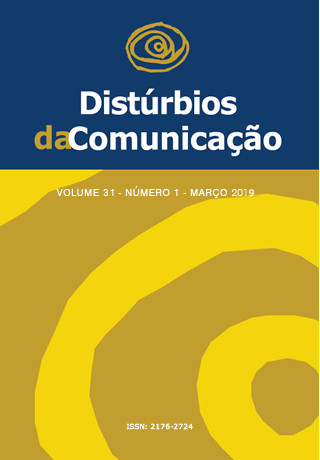Comparação entre avaliações de linguagem na infância e sua relação com risco psíquico
DOI:
https://doi.org/10.23925/2176-2724.2019v31i1p104-118Palavras-chave:
Linguagem Infantil, Avaliação, Sintomas psíquicosResumo
Objetivo: Comparar os resultados das avaliações de linguagem obtidas por protocolos centrados nas habilidades das crianças com os resultados de uma análise enunciativa em casos de atraso de linguagem, relacionando-os ao psiquismo. Método: Estudo de caso longitudinal, qualitativo, com três crianças de 24 meses. Elas foram avaliadas em suas habilidades linguísticas por meio dos protocolos DENVER II e BAYLEY III. A avaliação enunciativa foi realizada por meio da análise dos vídeos das interações entre as mães e os bebês a partir dos quais foram identificados os mecanismos e estratégias enunciativas. O risco psíquico foi avaliado por meio dos Indicadores Clínicos de Referência ao Desenvolvimento Infantil (IRDI) e Sinais PREAUT e comparado aos resultados do MCHAT. Resultados: As avaliações de linguagem demonstraram que o teste Bayley III é mais sensível ao atraso no domínio gramatical do que o Denver II. As análises enunciativas demonstraram a limitação nos mecanismos enunciativos no caso de risco psíquico mais grave, mas também as potencialidades linguísticas das crianças. Conclusão: A comparação permitiu identificar a diferença entre testes padronizados e a avaliação enunciativa, pois a limitação em mecanismos enunciativos e em alguns itens relacionados ao endereçamento da fala ao outro no teste Bayley III permitiu identificar as limitações de linguagem relacionadas com as alterações na intersubjetividade.
Downloads
Downloads
Publicado
Edição
Seção
Licença
Copyright (c) 2019 Camila Gomes Nazario, Inae Costa Rechia, Isabela de Moraes Fattore, Sabrina Felin Nunes, Ana Paula Ramos de Souza

Este trabalho está licenciado sob uma licença Creative Commons Attribution 4.0 International License.









